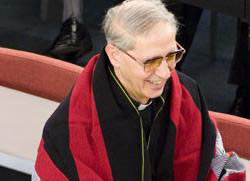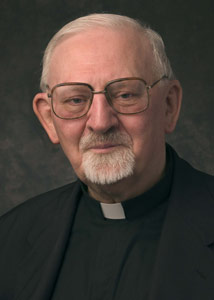UN NOUVEAU PAPE NOIR ARRIVE
Election d’Adolfo Nicolas au poste de général des Jésuites

La 35ème congrégation générale des Jésuites réunie à Rome a élu samedi à sa tête l’Espagnol Adolfo Nicolas en remplacement du néerlandais Peter-Hans Kolvenbach, a annoncé la compagnie de Jésus dans un communiqué.
35th General Congregation Elects Adolfo Nicolás. He is now Father General to nearly 20,000 Jesuits worldwide, including 2,900 in the United States, and the 29th successor to St. Ignatius Loyola who founded the Jesuits in 1540.
Le 29e successeur d’Ignace de Loyola, âgé de 71 ans, a passé l’essentiel de sa vie comme missionnaire au Japon
br>et était jusqu’à ce jour président de la conférence des Jésuites d’Asie de l’Est et d’Océanie.
br>« Il s’agit d’un choix judicieux car (Adolfo Nicolas) est une personnalité ouverte tant théologiquement qu’humainement « , a commenté le père José Maria de Vera, responsable de la Communication des Jésuites.
« Il a une expérience multiculturelle.
Il a étudié aux Etats-Unis, à Rome et au Japon.
C’est quelqu’un d’équilibré, sans ambitions personnelles, br>un homme moderne, sociable et sans autoritarisme », a-t-il estimé.
Le père Adolfo Nicolas a obtenu la majorité des votes des 217 délégués électeurs représentant les 19.OOO membres de la « Compagnie de Jésus » et réunis depuis le 7 janvier pour élire le successeur de Peter-Hans Kolvenbach, démissionnaire à l’approche de son 80ème anniversaire
Le nouveau « pape noir » – le surnom donné au supérieur général en raison de la couleur de son habit ecclésiastique et du pouvoir occulte que l’histoire lui a longtemps prêté à l’ombre du pape – aura la lourde tâche de donner un nouveau souffle à l’ordre fondé en 1540 par l’Espagnol Ignace de Loyola.
La société de Jésus est l’un des ordres religieux les plus influents de l’Eglise catholique mais traverse une crise d’identité due à la chute des vocations et à la concurrence d’ordres plus récents.
Les jésuites, qui étaient 30.000 en 1964, on vu leurs effectifs fondre ces dernières décennies.
En perte de vitesse en Europe, ils sont maintenant majoritairement en Asie, en Amérique latine et en Afrique. Au Vatican, ils possèdent des universités et des revues et un jésuite, Federico Lombardi, cumule les fonctions de directeur de Radio Vatican et de la salle de presse.
Peter-Hans Kolvenbach avait démissionné de son poste

Une démission sans précédent
Elu à vie en 1983, le « général » Kolvenbach avait annoncé en 2006 son souhait de passer la main. « Une nouvelle vision peut contribuer à un gouvernement plus adapté à un monde en rapide changement », avait-t-il alors fait valoir pour expliquer cette démission sans précédent dans l’histoire de la société.
Le P. Peter Hans Kolvenbach devint général des jésuites à sa grande surprise. Étant donné la réputation des Néerlandais dans l’Église catholique à l’époque, il pensait n’avoir aucune chance. Surtout, son expérience romaine était limitée, ayant passé les vingt-cinq années précédentes au Proche-Orient, loin des grandes préoccupations de la Compagnie : « C’était la guerre au Liban, et les soucis étaient avant tout de savoir si nous aurions à manger et à boire, si nous aurions ou non de l’électricité », se souvient-il.
S’il a été élu, c’est pourtant que le P. Kolvenbach possédait les qualités nécessaires pour succéder au P. Pedro Arrupe. De fait, cet homme simple et affable, empreint de réserve, polyglotte, spécialiste reconnu des langues orientales et parfait francophone, est aussi un fin diplomate. Autant de qualités qui lui ont valu la confiance de ses compagnons en même temps que de Jean-Paul II pour être élu « pape noir ». Des qualités forgées au fil d’un parcours bien particulier.
Who is Father Nicolás ?
Father Nicolás was born in Spain, earned a degree in systematic theology from the Pontifical Gregorian University in Rome, taught at the Sophia University in Tokyo, directed the East Asia Pastoral Institute in the Philippines, served as presiding secretary of the 34th General Congregation in 1995, and speaks five languages. His visits to the United States have included stops at the Arrupe Experience, an annual preparation program for American Jesuits nearing ordination.
PROFILE OF SUPERIOR GENERAL ADOLFO NICOLAS
A conversation is an exchange. It leaves neither participant unchanged. This is something that Jesuits and other Christians working in Asia have found for centuries.
It’s been 46 years since Father Adolfo Nicolás first traveled to Japan as a missionary from Spain. His has been a long conversation, first in Japan, but also in Korea and more recently in the Philippines. It’s left him convinced that the West does not have a monopoly on meaning and spirituality, and can learn a lot from the experience of Asian cultures.
‘Asia has a lot yet to offer to the Church, to the whole Church, but we haven’t done it yet’, he says. ‘Maybe we have not been courageous enough, or we haven’t taken the risks that we should.’
It speaks volumes that when Father Nicolás talks about Asia, he uses the term ‘we’. As President of the Jesuit Conference of South East Asia and Oceania, he’s responsible for bringing Jesuits across the region together to think beyond their own countries, and confront challenges facing the globe.
The group he represents stretches from China and Myanmar in the west, to Korea in the north, Australia in the south, and Micronesia in the east. It brings together an incredibly diverse group of cultures and societies. From countries where Christianity has been strong in the past, but is on the wane, to places where Christians make up a small but vibrant minority.
Asked if people from a culture like Japan experience Ignatian Spirituality differently than those in the West, Father Nicolás says the experience was indeed different, but it had yet to be formulated.
‘I think the real experience of the Japanese is different. And it should be different. But the formulation continues to be very much a Western formulation’, he says.
A Japanese Jesuit, Father Katoaki, has recently translated and added comments on the book of the Exercises from a Japanese-Buddhist perspective. Father Adolfo says there has also been some discussion on whether the Exercises could be presented to non-Christians, and how that might occur.
‘The question is how to give the Ignatian experience to a Buddhist’, he says. ‘Not maybe formulated in Christian terms, which is what Ignatius asked, but to go to the core of the experience. What happens to a person that goes through a number of exercises that really turn a person inside-out. This is still for us a big challenge.’
While some work has been done comparing the Ignatian experience with that of Hindus, he says there hasn’t been a lot of work on finding similarities say in Japanese, Chinese or Korean cultures. He says East Asia has been more slow to do this in India, partly because the East Asians have a strong respect for tradition, and hence a respect for Christianity’s European traditions. However, the region’s remoteness also gives it more freedom to be creative.
‘There is more space for experimenting, for trying, for thinking and exchanging’, he says.
Essentially, he says the Exercises are about letting God guide people. This is something that those directing retreats have been wary of in the past, but something that is important when dealing with people from different cultural backgrounds.
‘The fact is, if God is guiding then the Japanese will be guided the Japanese way. And the same with the Chinese, and with people from other religions’, he says.
‘Then the director simply has to be perceptive, to see signs that here God is saying something that I don’t understand, and be humble enough to say continue as long as you keep sane and balanced etc.’
Others throughout Asia are dealing more directly with questions of cultural difference, working as missionaries in countries like Cambodia and Myanmar. Father Nicolás says he’s wary of missionaries who don’t enter into the lives of the people, but keep the patterns of their home cultures – Europe or Latin America – alive in their mind. For them, it’s not about exchange but about teaching and imposing orthodoxy.
‘Those who enter into the lives of the people, they begin to question their own positions very radically’, he says. ‘Because they see genuine humanity in the simple people, and yet they see that this genuine humanity is finding a depth of simplicity, of honesty, of goodness that does not come from our sources.’
That conversation must continue, if we are to learn from Asia and Asia is to learn from us.
‘That is a tremendous challenge, and I think it’s a challenge that we have to face. We don’t have a monopoly, and we have a lot to learn.’
By Michael McVeigh




